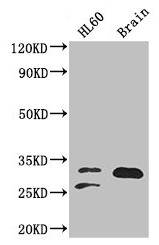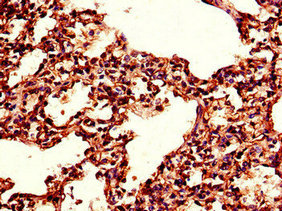Full Product Name
Rabbit anti-Homo sapiens (Human) TPI1 Polyclonal antibody
Alternative Names
TPI1 antibody; TPI antibody; Triosephosphate isomerase antibody; TIM antibody; EC 5.3.1.1 antibody; Methylglyoxal synthase antibody; EC 4.2.3.3 antibody; Triose-phosphate isomerase antibody
Species Reactivity
Human, Mouse
Immunogen
Recombinant Human Triosephosphate isomerase protein (169-228AA)
Immunogen Species
Homo sapiens (Human)
Conjugate
Non-conjugated
The TPI1 Antibody (Product code: CSB-PA13499A0Rb) is Non-conjugated. For TPI1 Antibody with conjugates, please check the following table.
Available Conjugates
| Conjugate |
Product Code |
Product Name |
Application |
| HRP |
CSB-PA13499B0Rb |
TPI1 Antibody, HRP conjugated |
ELISA |
| FITC |
CSB-PA13499C0Rb |
TPI1 Antibody, FITC conjugated |
|
| Biotin |
CSB-PA13499D0Rb |
TPI1 Antibody, Biotin conjugated |
ELISA |
Purification Method
>95%, Protein G purified
Concentration
It differs from different batches. Please contact us to confirm it.
Buffer
Preservative: 0.03% Proclin 300
Constituents: 50% Glycerol, 0.01M PBS, PH 7.4
Tested Applications
ELISA, WB, IHC
Recommended Dilution
| Application |
Recommended Dilution |
| WB |
1:500-1:5000 |
| IHC |
1:20-1:200 |
Storage
Upon receipt, store at -20°C or -80°C. Avoid repeated freeze.
Lead Time
Basically, we can dispatch the products out in 1-3 working days after receiving your orders. Delivery time maybe differs from different purchasing way or location, please kindly consult your local distributors for specific delivery time.
Usage
For Research Use Only. Not for use in diagnostic or therapeutic procedures.








